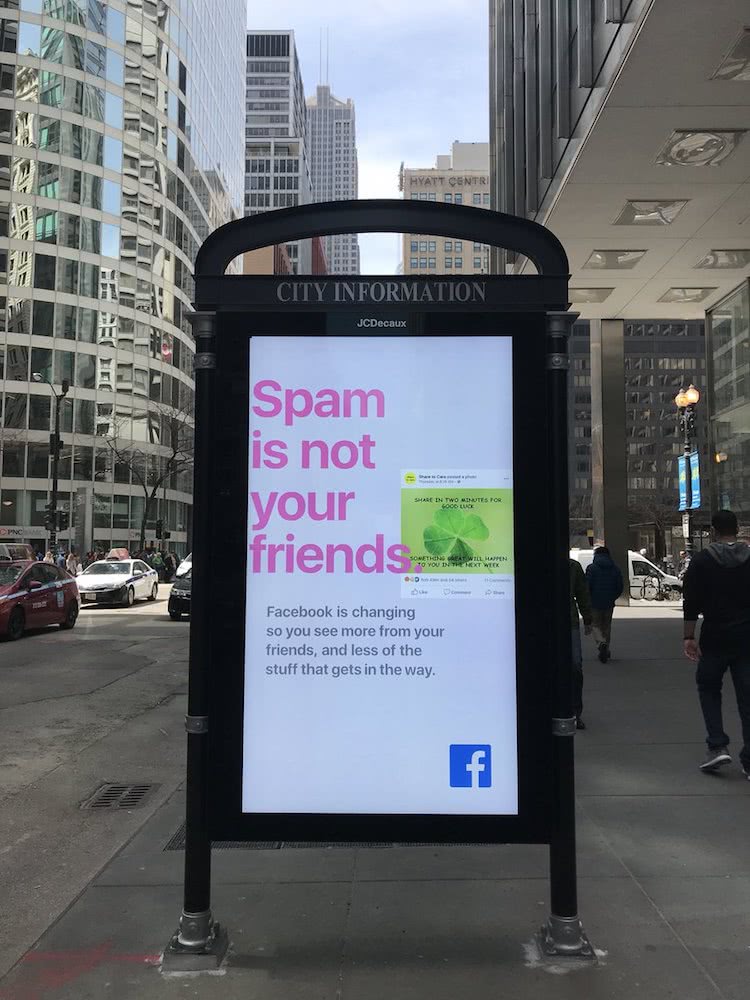Does Facebook even want youths on its platform? Marketing managers and artists, take note

Late last year, when Facebook announced plans to switch up the algorithm to de-prioritise posts, brands and artists took note.
Last October, Facebook announced it was “testing two separate feeds, one as a dedicated space with posts from friends and family and another as a dedicated space for posts from Pages.” Essentially, removing content from any Business Page from its main feed – that’s artists, brands, and even media like us.
Now, in a video that forms part of its new ‘Here Together’ campaign to curb misinformation and false news, Facebook makes one thing very clear: it is prioritising marketing to families and people who fall into an older demographic.
“We came here for the friends […] but then had to deal with spam, clickbait, and data misuse. That’s going to change,” Facebook says in the clip.
Don’t even get us started on the term ‘data misuse’ here – Mark Zuckerburg is currently under fire over findings Facebook breached the trust of its users with the kind of data it gave Cambridge Analytica. However, this bad press has contributed greatly to the new campaign, which features billboards and advertisements running on TV and in cinemas.
The campaign heavily features people who fall under an older demographic and even uses language like, “Our old friends from Middle School, our mum, and then our boss joined forces to wish us happy birthday”.
Watch the video for Facebook’s ‘Here Together’ campaign for the UK below:
Could Facebook be leaning in to its large 25-34 demographic and leaning away from catering to youths? And if this is the case, then where does this leave marketing managers who have bands with young demographics, or say, any artist who creates commercial pop, that wants to reach some of Facebook’s 2,2 billion monthly users?
Under the new regime, bands and brands that post humourous content, memes, and content that sells products or clothing (re: merch), will have the visibility of their posts right scaled back.
With this in mind, should marketers who have an underage audience be investing their advertising dollars into Facebook, when the social giant has made clear its intentions to minimise the reach of content created for youths?
Despite this survey from Forrester Research in the US, which found that 34% of online US teenagers think that Facebook is “for old people”, 76% of 12 to 17 year olds use the platform.
Facebook also announced three major areas where its new ethos would be implemented:
Fake News
– We’re showing you background information on the articles and publishers appearing in your News Feed
– We’re working with more fact-checkers globally, to better evaluate the credibility of articles you see on Facebook
– We’re reducing the visibility of posts that we know to be fake news
– We’re making it harder for peddlers of fake news to make money from their harmful activity
– We’re removing fake accounts more quickly by hiring more reviewers and developing new AI tools

Source: Twitter
Privacy
– We’re making privacy controls easier to find and use
– We’re updating our privacy settings and keeping you informed of changes, so you can review and make your own choices
– We’re giving you more control over which apps can use your data and how they can use it
– We’ve launched the ‘Data Abuse Bounty’, which rewards people who report misuse of data
Safety
– We’ve invested in technology to automatically detect content that violates our policies, and to delete it
– We’ve created a wide range of tools to tackle the safety concerns that members of our community may have
Perhaps it’s time to double-down on Twitter’s 330 million active users? 37% of Twitter users are between ages of 18 and 29, after all. Keep in mind, Twitter doesn’t reveal stats for its under 18 demographic; but sources say that as the demo gets younger, the number of users get higher – just check out Twitter accounts like Tyde Levi, Don’t Bore Us, and State Champs.
This article originally appeared on The Industry Observer, which is now part of The Music Network.






























